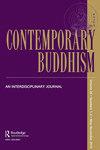Coping with the quarter-life crisis the buddhist way in the Czech Republic
IF 0.1
3区 哲学
0 PHILOSOPHY
引用次数: 2
Abstract
ABSTRACT The article examines the phenomenon known as the quarter-life crisis. The aim was to explore how young people in the Czech Republic practising Buddhism experience this crisis and how Buddhism influences the way they cope. Qualitative research was used to gain insight into how respondents experience this life phase and whether they perceive the world of too many opportunities as a challenge or a problem. The relationship with consumer culture and material consumption was discussed along with the practice of Buddhism and the way Buddhism-based values play a role in influencing respondents’ lives. Respondents showed they are missing a set of principles and values to ease their orientation in the world and their decision-making process. They found in Buddhism a structure that helps them form a delimitation against consumer and non-sustainable production. As a result of adhering to Buddhism and engaging in some practices based on Buddhism, they reported more control in self-directing together with a growth in self-confidence during the decision-making process. At the same time, they overcame feelings of exclusion, observed as one of the manifestations of a young age crisis. They reported that establishing contacts with like-minded young people, whether in meditation, sports centres or discussion forums on social networking sites, gave them a sense of belonging to a group.捷克共和国的佛教方式应对四分之一人生危机
摘要本文探讨了被称为季度生活危机的现象。目的是探索捷克共和国信奉佛教的年轻人如何经历这场危机,以及佛教如何影响他们的应对方式。定性研究被用来深入了解受访者是如何经历这一人生阶段的,以及他们是否认为这个充满太多机会的世界是一个挑战还是一个问题。讨论了消费文化和物质消费之间的关系,以及佛教的实践以及佛教价值观在影响受访者生活中的作用。受访者表示,他们缺少一套原则和价值观来缓解他们在世界上的定位和决策过程。他们在佛教中发现了一种结构,这种结构有助于他们形成对消费者和非可持续生产的界限。由于坚持佛教并从事一些基于佛教的实践,他们报告说,在决策过程中,他们在自我指导方面有了更多的控制力,自信心也有所增强。与此同时,他们克服了被排斥的感觉,这被视为年轻危机的表现之一。他们报告说,无论是在冥想、体育中心还是社交网站上的讨论论坛上,与志同道合的年轻人建立联系,都会让他们有一种归属感。
本文章由计算机程序翻译,如有差异,请以英文原文为准。
求助全文
约1分钟内获得全文
求助全文

 求助内容:
求助内容: 应助结果提醒方式:
应助结果提醒方式:


